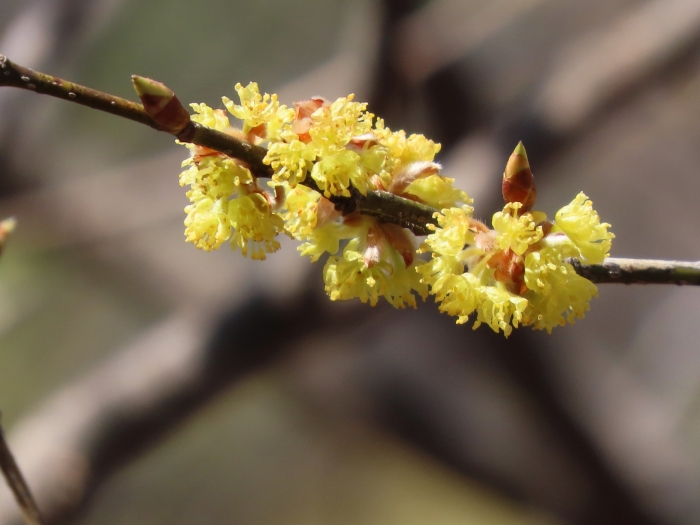Blunt-Lobed Spice Bush
(Lindera obtusiloba)
Blunt-Lobed Spice Bush (Lindera obtusiloba)
/
/

© belvedere04
CC BY 4.0
Image By:
© belvedere04
Recorded By:
Copyright:
CC BY 4.0
Copyright Notice:
Photo by: © belvedere04 | License Type: CC BY 4.0 | License URL: http://creativecommons.org/licenses/by/4.0/ | Uploader: belvedere04 | Publisher: iNaturalist |

























Estimated Native Range
Summary
Lindera obtusiloba, commonly known as the blunt-lobed spice bush, is a deciduous shrub or small tree native to the understory of deciduous forests in East Asia, specifically China, Korea, and Japan. It typically grows up to 20 feet in height and width. The plant features a rounded habit with multiple stems and branches. Its leaves are glossy and aromatic, with a distinctive three-lobed shape that turns a vibrant yellow in autumn. The deep yellow, star-shaped flowers are small but numerous, appearing in early spring before the foliage and are mildly showy. The juvenile leaves exhibit a deep purple hue, adding to the plant’s ornamental value.
The blunt-lobed spice bush is valued for its aromatic foliage, attractive yellow fall color, and the early spring flowers that provide interest before many other plants have leafed out. It has been awarded the Royal Horticultural Society’s Award of Garden Merit, indicating its excellence for garden use. In cultivation, it is used for border planting, as a specimen plant, or in woodland gardens. It prefers moist, well-drained soils and can tolerate part shade, though it will also grow in full sun. While generally low-maintenance, it can be susceptible to leaf spot diseases. The plant’s anti-inflammatory properties, including the presence of the anti-histamine compound koaburaside, suggest potential medicinal uses, although these are not commonly exploited in garden cultivation.CC BY-SA 4.0
The blunt-lobed spice bush is valued for its aromatic foliage, attractive yellow fall color, and the early spring flowers that provide interest before many other plants have leafed out. It has been awarded the Royal Horticultural Society’s Award of Garden Merit, indicating its excellence for garden use. In cultivation, it is used for border planting, as a specimen plant, or in woodland gardens. It prefers moist, well-drained soils and can tolerate part shade, though it will also grow in full sun. While generally low-maintenance, it can be susceptible to leaf spot diseases. The plant’s anti-inflammatory properties, including the presence of the anti-histamine compound koaburaside, suggest potential medicinal uses, although these are not commonly exploited in garden cultivation.CC BY-SA 4.0
Plant Description
- Plant Type: Shrub, Tree
- Height: 10-20 feet
- Width: 10-15 feet
- Growth Rate: Slow
- Flower Color: Yellow
- Flowering Season: Spring
- Leaf Retention: Deciduous
Growth Requirements
- Sun: Full Sun, Part Shade
- Water: Medium
- Drainage: Medium, Slow
Common Uses
Bird Garden, Butterfly Garden, Deer Resistant, Low Maintenance
Natural Habitat
Understory of deciduous forests in East Asia
Other Names
Common Names: Japanese Spicebush
Scientific Names: , Lindera obtusiloba, ? ovata, Benzoin cercidifolium, Benzoin obtusilobum, Benzoin obtusilobum f. quinquelobum, Benzoin obtusilobum f. villosum, Benzoin obtusilobum var. ovatum, Benzoin obtusilobum var. ovatum, Lindera cercidifolia
GBIF Accepted Name: